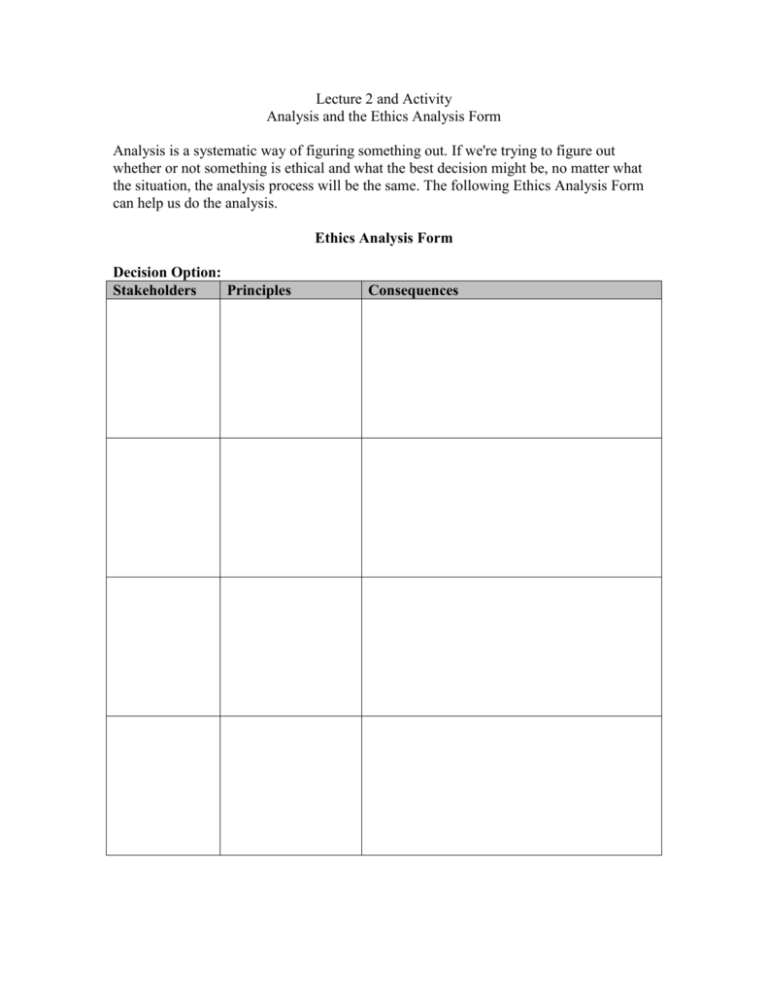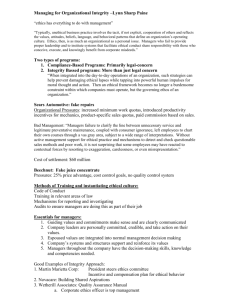Lecture 2 and Activity
advertisement

Lecture 2 and Activity Analysis and the Ethics Analysis Form Analysis is a systematic way of figuring something out. If we're trying to figure out whether or not something is ethical and what the best decision might be, no matter what the situation, the analysis process will be the same. The following Ethics Analysis Form can help us do the analysis. Ethics Analysis Form Decision Option: Stakeholders Principles Consequences The form has spaces for the decision option we are considering, the stakeholders (those who may be affected by the decision), the ethical principles involved in the situation, and the consequences of the particular decision on various stakeholders. Let's consider the following situation: A manager promotes a personal favorite employee without going through the usual selection process. Have you ever experienced something like this at any one of your jobs? Do managers like some employees better than others? Do teachers like some students better than others? (Of course!) We all like some people better than others. The key, though, is to keep in mind what is best for business. As managers we may want to promote the employee we like best. But, what we as managers should remember to do is think about our decision before we make it. We ask ourselves: What are we trying to accomplish? Is what we are trying to accomplish okay? Will we be able to accomplish it with this particular decision? We can use the Ethical Analysis Form to help us to systematically work through the decision option. Decision Option and Stakeholders: The first step is to identify the decision option. In this case the manager decided to promote his or her favorite employee without going through the usual selection process. Enter this on a blank form. They key is below to serve as a guideline. Next we must figure out who the stakeholders are. Who may be affected by the manager's decision? (other employees, manager, the favorite employee who got the promotion, customers, place of business) Write the Stakeholders on the form. Consenquences: Now, without looking at the key, please enter the possible consequences to each of the stakeholders on the form. You can start your analysis by asking "What will each of the stakeholders think or do and how will they feel if the manager does what he or she is considering?" Write your answers on the form. Ethical Principles: Either use the Ethical Principles for Hospitality Managers in your text or print out the list from Lesson one and see which of the Ethical Principles are violated by the decision to promote a favorite employee without going through the usual selection process. The manager is the decision maker in this situation. We are looking for principles that are violated by the decision maker, so we enter them in the "principles" space in the Manager row. What about Integrity? Trustworthiness? Loyalty? Fairness? Commitment to Excellence? Leadership? Reputation and Morale? Accountability? The decision to promote his or her favorite employee without going through the usual selection process violates quite a few of the ethical principles. It is possible that the other employees would not be bothered, but the opposite reaction is more likely and that could affect their attitudes and performance and eventually cause the manager problems. The idea is to avoid problems. It would be better to go through the usual selection process and promote the employee who is best suited and deserving of the promotion. It could turn out to be the favorite employee, but if the selection process was indeed followed, the promotion would be seen as fair and equitable, and possible negative consequences could be avoided. Ethics Analysis Form - Key Decision Option: To promote a favorite employee without going through the usual selection process Stakeholders Principles Consequences Other The other employees might become Employees angry and resentful and feel less regard for the job and the manager. They might be less cooperative. Service levels might decrease. They might tell friends which could affect the reputation of the business as a good place to work Absenteeism and turnover could increase. Manager Fairness Other employees might see the (Decision Concern & Respect promotion as unfair, and they could Maker) for Others lose respect and trust for the manager. Commitment to Other employees could become less Excellent cooperative, their service levels could Leadership fall, and absenteeism and turnover Reputation & could increase as morale falls. This Morale could negatively affect the manager's Accountability success in his or her position. If the manager's department suffers, he or she could lose credibility with superiors. The Promoted The promoted employee could face Employee resentment and/or abuse from other employees. If the promoted employee is to supervise fellow workers, he or she may be unable to gain their goodwill and cooperation and ultimately fail in the new position. Customers The employees' work quality could fall, their enthusiasm could diminish, and/or their attitude could become negative. Customers could become dissatisfied with the service, tell others, and business could decrease. The Company The reputation of the company as a good place to frequent or work at could be tarnished. The company could lose business and have fewer, less qualified available workers.






